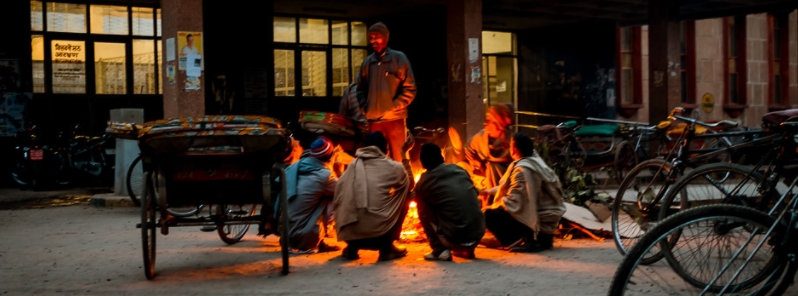Delhi sees coldest June day amid streak of record-breaking weather since August 2020, India

India's capital Delhi has seen its coldest June day on record on Tuesday, June 1, 2021, with temperatures plummeting to 17.9 °C (64.2 °F). The city has been on a streak of breaking weather records since August 2020, with at least one major record busted each and every month.
On Tuesday, a dust storm and late-night rain brought Delhi's temperature down to 17.9 °C (64.2 °F)– the city's coldest day recorded in June.
According to the India Meteorological Department (IMD), the previous coldest minimum temperature in Delhi for the month of June was 18 °C (64.4 °F), set on June 17, 2006.
The recent temperature continued the city's trend of breaking historical weather records every month since last year. As Hindustan Times called it, the capital was "on a weather barrier-breaking streak for at least the last nine months."
In August 2020, Delhi registered 236.5 mm (9.3 inches) of rain– the highest for the month since 2013.
In September, the city registered its warmest month in nearly 20 years, with the average maximum temperature hitting 36.2 °C (97.2 °F). It broke the previous record of 36.1 °C (97 °F) set in 2015.
The last time Delhi registered a higher average maximum temperature in September was in 2001 when the temperature shoots up to 36.3 °C 97.3 °F).
In October, the capital smashed a 58-year-old record by registering a mean minimum temperature of just 17.2 °C (63 °F).
In November, Delhi busted an even older record as the month's mean minimum temperature pummeled to 10.2 °C (50.4 °F). It was a level last witnessed in 1949.
A cold wave then gripped the city for eight days in December, the longest streak since 1965.



In January 2021, a cold snap lingered over the capita for seven days– the highest number of cold wave days since 2008.
During the same month, the city was drenched by 56.6 mm (2.2 inches) of rain, which was the highest January rain in 21 years.
The weather abruptly changed in February, when the city recorded its second warmest in 120 years as the mean maximum temperature in the month hit 27.9 °C (82.2°F). The all-time record was 29.7 °C (85.5 °F) set in 2006.
Delhi then continued to swelter through warm temperatures in March as it recorded 40.1 °C (104.2 °F) on the 29th— its hottest day in 76 years.




Weather conditions suddenly changed again in April, with the capital recording 11.7 °C (53 °F) on the 4th— the lowest minimum temperature in at least a decade.
In May, due to the impact of Cyclone Tauktae, Delhi busted the record for the highest single-day rainfall for the month with 119.3 mm (4.7 inches) on May 19 and 20. Now, in June, a new record has been set.
"Usually, pre-monsoon activities are triggered due to western disturbances and induced cyclonic circulations," said Skymet Weather Vice President, Mahesh Palawat.
"These act as trigger mechanisms for the development of thunderclouds which further leads to pre-monsoon intense weather activities such as dust storms or thundershowers."


Featured image credit: Flickr

Commenting rules and guidelines
We value the thoughts and opinions of our readers and welcome healthy discussions on our website. In order to maintain a respectful and positive community, we ask that all commenters follow these rules:
We reserve the right to remove any comments that violate these rules. By commenting on our website, you agree to abide by these guidelines. Thank you for helping to create a positive and welcoming environment for all.